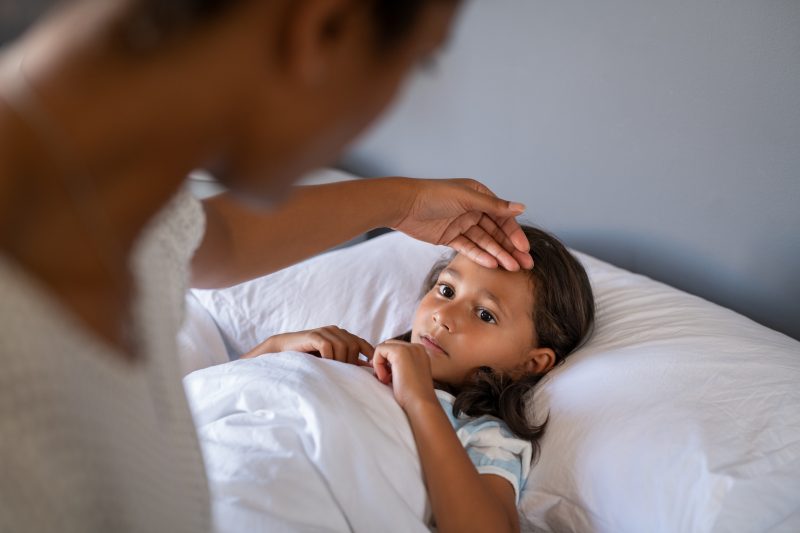 The delta variant has become the predominant cause of COVID-19 infection in Ohio and throughout the country. With cases and hospitalizations on the rise, our children are vulnerable to infection.
The delta variant has become the predominant cause of COVID-19 infection in Ohio and throughout the country. With cases and hospitalizations on the rise, our children are vulnerable to infection.
Dr. Eric Robinette, a pediatric infectious disease physician at Akron Children’s, answers parents’ top questions about the COVID-19 delta variant, the vaccine and ways to keep our children safe.
What is the big deal about the delta variant?
The “delta” variant, a strain of the COVID-19 virus, is much more contagious than the original version. Because of this, we have seen a large spike in delta-variant cases, primarily among unvaccinated adults and kids.
In some states, this spike has exceeded peaks we saw last January at the height of the original pandemic. It has caused a large number of deaths and placed tremendous strain on our healthcare system’s ability to properly care for patients with both COVID and non-COVID-19 illnesses.
Why are we talking about COVID-19 booster shots?
While fully vaccinated people remain highly protected against hospitalization and death from the delta variant, we have recently seen a higher rate of breakthrough infections. It’s not clear as to whether this is due to declining immunity or because the vaccine is not working as well against the delta variant. It’s probably a little of both.
Recent studies have shown a booster shot increases antibody levels at or above those seen at their peak levels after the second dose. We believe this will provide further protection for those at high risk of infection or complications from COVID-19.

Akron Children’s pediatric infectious disease physician Dr. Eric Robinette answers your questions about the COVID-19 delta variant.
Can kids get a COVID-19 vaccine together with their flu shot (or other vaccine)?
Yes! Vaccines given at the same time rarely interfere with each other’s effectiveness.
Childhood immunizations against routine illnesses decreased during the pandemic. It’s extremely important that children keep up with their routine vaccination schedule to protect them from serious illness.
Kids don’t get very sick from COVID-19. Why should they get vaccinated?
It’s true that kids are less vulnerable than the elderly to serious complications from COVID-19. However, the rate at which kids have complications from COVID-19 is the same or higher than for other common childhood illnesses, such as influenza, for which we routinely vaccinate.
The bottom line is the vaccine is many times safer than taking a chance with COVID-19, even among low-risk populations, such as healthy kids. One study found that vaccinating 1 million kids and young adults would prevent 11,000 cases of COVID-19, 560 hospitalizations, 138 ICU admissions and 6 deaths.
As an added benefit, vaccinating kids helps reduce the spread of COVID-19 in the community and adds another layer of protection to those at higher risk of complications from the virus.
Why should children wear masks?
With school back in session, there are 2 key goals for children with respect to COVID-19: The first is to keep children as healthy and safe as possible and secondly, to keep them in the classroom.
It is clear that masks are effective in reducing COVID-19 transmission in adults. In addition, many studies have shown that masking, in combination with other precautions, have clearly reduced the transmission of COVID-19 in school settings. Plus, there is little-to-no evidence suggesting that masking is harmful to children. Therefore, masking children is an important tool to help keep kids healthy in school and learning successfully until the pandemic improves.
Does avoiding “natural” infections weaken my child’s immune system?
Immunity is largely based on how well a child’s immune system remembers a specific infection. In general, an infection builds immunity only against that specific infection. For example, getting influenza provides immunity only against influenza and it doesn’t make a child’s immune system any better at fighting other infections, such as COVID-19 or RSV.
Some infections are more memorable than others. For example, measles is essentially unforgettable, and once children get it or are vaccinated against it, they are protected for life. Conversely, a child’s immune system tends to “forget” infections, such as RSV, relatively quickly. As a consequence, kids tend to get RSV multiple times throughout childhood. Both vaccines and infections can “teach” an immune system to “remember” an infection.
Last winter, precautions used during the COVID-19 pandemic were highly effective in preventing the spread of RSV in kids. Now that those precautions have been lifted, we are seeing an out-of-season RSV epidemic. This is not the case because those children’s immune systems were weakened last winter, but simply because their immune systems don’t remember RSV. So while it is true certain precautions like masking may not prevent an infection such as RSV forever, they can delay them and spread the infections out over time to avoid major spikes that strain our healthcare system. In delaying these infections, there is no harm done to children’s ability to fight infections.
For more information, schedule an appointment with one of our pediatricians by calling 330-543-2778. Telehealth appointments are available.
Learn more about Akron Children’s COVID-19 response and resources available for families.








